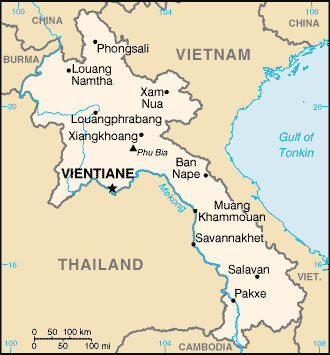
The small and land-locked country of Laos, a communist nation of not quite 7.5 million persons, was officially designated a "recalcitrant" nation by the United States in July 2018 for its refusal to accept repatriation of Laotian deportees. In April of this year, in an act that seems to have flown under the radar of American media, it gained the unenviable distinction of being one of the only countries ever hit by the State Department with a second round of visa sanctions in an attempt to persuade the country's leaders to reconsider their stance. What this means is that U.S. consular officers will grant neither immigrant (permanent) nor nonimmigrant (temporary) visas to Lao nationals seeking to enter the United States.
We at the Center for Immigration Studies (CIS) have periodically written about the persistent problem of countries that, for various reasons, refuse to accept back their own citizens as deportees. (See, e.g., here, here, and here.) As often as not, the aliens whom the United States is attempting to deport pursuant to final orders of removal have significant criminal histories.
When they cannot be removed because their country of nationality refuses to issue the needed repatriation documents, they end up back on the streets of America once it becomes evident that deportation can't be effected, due to a Supreme Court decision time-limiting the government's detention. Thus, it becomes a matter of public safety, and occasionally national security, for efforts to obtain the needed documents and permissions to bear fruit. Even so, many countries resist their obligation to agree to repatriation of their own citizens under international law — perhaps in no small measure because they don't really want to receive criminals back into their society.
The Immigration and Nationality Act (INA), at Sec. 243(d), provides for the possibility of sanctioning such "recalcitrant" countries through the withholding of visas. In fact, it says that "the Secretary of State shall order consular officers in that foreign country to discontinue granting immigrant visas or nonimmigrant visas, or both" (emphasis added), but despite the proscriptive language, until the present administration, the proviso was rarely invoked as a way of pressuring nations to meet their responsibilities.
That has changed, and Immigration and Customs Enforcement (ICE) now maintains a list of recalcitrant countries, which it shares with the State Department so that diplomatic efforts short of sanctions may be undertaken. In several cases, though, the next step has been invoked and issuance of nonimmigrant visas has been suspended. Suspending nonimmigrant visas is generally considered a less consequential step since the stay of such individuals in the United States is temporary, whereas suspending immigrant visas often means that family members will not be reunited and skilled professionals will not be permitted to enter to work permanently for petitioning employers. It is a step the United States is loath to take until there is no other recourse.
Although there is diplomatic recognition and exchange of embassies, the Laos-U.S. relationship remains distant, unlike the warming relations between the United States and Cambodia and Vietnam, two other countries in Southeast Asia that underwent foment and revolution during the serial wars of the 1950s through 1970s (first against the French, then against the reigning governments with U.S. backing). While this second round of sanctions will undoubtedly further strain the relationship, one hopes it may in the end result in a change of heart.
Meantime, other countries that have also seen the first round of sanctions against nonimmigrant visas applied, but not modified their behavior, should probably sit up and take notice — particularly since some of them, unlike Laos, will be severely adversely affected if action on significant numbers of immigrant visas are suspended.
